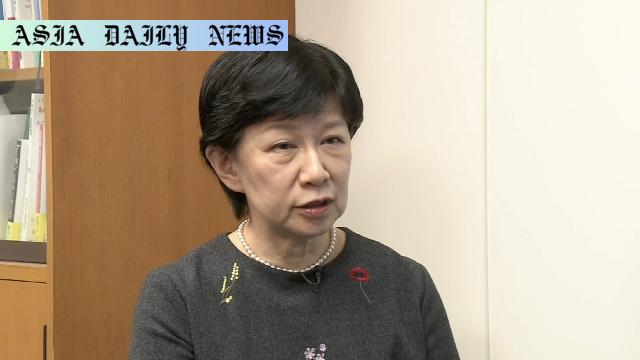Disarmament – UN’s Nakamitsu expresses crisis over international law challenges stemming from America’s unilateral actions.
- The UN’s disarmament chief expresses concern over ‘America First’ policy and its impact on international law.
- US withdrawal from global institutions and focus on unilateral actions risks weakening global stability.
- UN welcomes Trump’s openness to arms negotiations and encourages collaborative disarmament efforts.

UN Official Raises Alarm Over ‘America First’ Policy
Recently, Nakamitsu Izumi, the UN Under-Secretary-General and High Representative for Disarmament Affairs, voiced her concern regarding the implications of US President Donald Trump’s ‘America First’ policy. Speaking during her visit to Tokyo, Nakamitsu highlighted a troubling trend threatening the global order as nations increasingly prioritize unilateralism over collective action. Trump’s controversial approach, including the withdrawal from the World Health Organization (WHO), has drawn sharp criticism from international bodies and experts.
Challenges to Global Unity and International Law
Nakamitsu emphasized that the erosion of international law due to such policies could unravel decades of diplomacy and cooperation. She explained that Trump’s decisions were setting an unsettling precedent, as other countries might follow suit, further complicating efforts to address global issues such as disarmament, public health, and climate change. Nakamitsu’s remarks underscore the significant risk of destabilization within the international community, with no mechanism in place to hold countries accountable for such actions.
Hope Through Arms Reduction Dialogue
Despite these concerns, Nakamitsu acknowledged a glimmer of hope in Trump’s recent statements on pursuing nuclear arms reduction talks with Russia and China. Speaking at the World Economic Forum in Davos, Switzerland, Trump articulated a willingness to engage in multilateral discussions aimed at curbing the accelerating arms race. Nakamitsu described this as a step in the right direction, emphasizing the critical role of dialogue to achieve meaningful disarmament and global security.
The UN’s Role in Disarmament Efforts
The United Nations, according to Nakamitsu, stands ready to facilitate such conversations among key nations. By acting as a neutral intermediary, the UN aims to bridge gaps and encourage adherence to international treaties and protocols. Nakamitsu highlighted the necessity for collective recognition among states that competitive armament leads to mutually assured destruction rather than sustained benefit. In this light, the UN hopes for active participation from all nations in fostering a culture of disarmament.
Japan’s Unique Responsibility in Global Peace
As the only country to have endured atomic bombings, Japan has an unparalleled moral imperative to lead the disarmament dialogue. Nakamitsu urged Japan to leverage the significance of 2023 – marking 80 years since the end of World War II and the establishment of the UN – to take proactive steps in advocating global peace. Such leadership would not only strengthen their international standing but also be instrumental in driving meaningful outcomes in a fragmented world order.
The Consequences of Unilateralism
There is a growing recognition of the broader consequences of unilateral policies. By disengaging from multilateral platforms such as the WHO, Trump’s administration has signaled a retreat from the very international cooperation critical for tackling global emergencies, from pandemics to geopolitical conflicts. As Nakamitsu aptly pointed out, such trends inflict long-term damage on institutions designed to serve as safeguards for humanity and peace.
The Path Forward: Emphasizing Collaboration
To counteract such developments, the collective commitment of nations must be renewed. The United States’ stance will likely have lasting implications for the international community, making it crucial to steer discussions toward compromise and cooperation. Reaffirming faith in multilateralism will serve as a safeguard against the risks Nakamitsu outlined, ensuring future generations inherit a world governed by shared responsibility.
Conclusion
While challenges persist, hope remains. As Nakamitsu’s statement highlights, the power of dialogue and collaboration cannot be understated. The efforts of global leaders to reduce nuclear arsenals and reinforce international law offer a promising pathway forward. However, it requires consistent effort and dedication from all involved parties to maintain peace and stability. As the United Nations continues its disarmament advocacy, the international community must rally together for lasting change.



Commentary
Navigating the Crossroads of Unilateralism and Cooperation
The current commentary by Nakamitsu Izumi on the ‘America First’ policy and its worldwide ripple effects is both thought-provoking and timely. Her concerns highlight a growing shift away from collective problem-solving frameworks, which have historically served as the foundation of international stability. President Trump’s decision to withdraw the US from pivotal organizations like the WHO is emblematic of this trend, and the implications are indeed far-reaching.
The Threat to Global Governance
One might ask: What are the consequences if such actions persist unchecked? Nakamitsu’s apprehension about the potential collapse of international order lays bare the delicate balancing act nations must perform to protect established systems. The weakening of international laws and cooperative frameworks risks creating a fragmented world unable to effectively address crises such as pandemics, climate change, or weapons proliferation. Her message is thus a wake-up call to policymakers worldwide.
Finding a Silver Lining
In the same breath, Nakamitsu’s optimism regarding Trump’s willingness to negotiate arms reductions with China and Russia serves as a counterbalance to her critique. It suggests there is still room for progress, provided nations acknowledge their shared vulnerabilities. It is a poignant reminder that behind the political rhetoric lies an opportunity to fortify global peace through dialogue and cooperation.
Conclusion: A Call to Action
The global community is at a crossroads. Leaders must choose between retreating into isolation or embracing the promise of multilateralism. Nakamitsu’s appeal resonates deeply, underscoring the urgency of acting now to rejuvenate collective efforts. No one nation can navigate the challenges of an interconnected world in isolation; collaboration remains our best chance to tackle humanity’s most pressing issues.